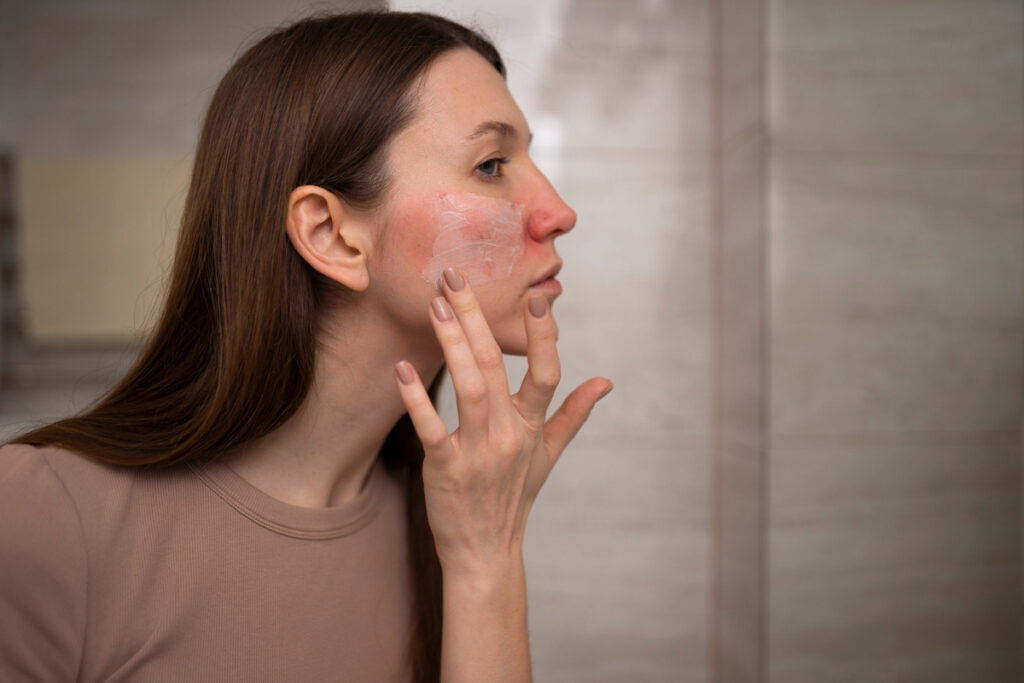Dermatologist recommended skin care routine for rosacea is crucial for managing the condition and keeping flare-ups under control.
Rosacea is a chronic skin condition that affects millions of people worldwide.
It causes redness, visible blood vessels, and in some cases, pimples on the face.
While the exact cause is not known, triggers such as hot beverages, spicy foods, alcohol, stress, and extreme weather can exacerbate symptoms.
The key to managing rosacea lies in developing a consistent and gentle skin care routine that addresses its unique challenges.
Dermatologist Recommended Skin Care Routine for Rosacea
When it comes to managing rosacea, dermatologists recommend a skin care routine that focuses on hydration, gentle cleansing, and the use of soothing ingredients.
The main goal is to avoid further irritation while addressing the symptoms like redness and dryness.
Avoid harsh products that could worsen the condition, such as those with alcohol, fragrance, or strong exfoliants.
Instead, opt for products that calm inflammation and provide deep hydration.
A proper skin care routine for rosacea is one that prioritizes calming, non-irritating ingredients and focuses on consistency.
Step 1: Cleansing Your Skin
The first step in a rosacea-friendly routine is cleansing.
Dermatologists advise using a mild, non-foaming cleanser that won’t strip the skin of its natural oils.
Opt for a gentle cleanser that doesn’t contain fragrances, alcohol, or other irritants that could trigger a flare-up.
Look for products that hydrate the skin while cleansing, such as those containing glycerin or ceramides.
Avoid using hot water, as it can aggravate rosacea.
Instead, cleanse with lukewarm water to soothe the skin.
Step 2: Moisturizing and Hydration
Moisturizing is a crucial step in any rosacea routine.
A well-hydrated skin barrier is essential for minimizing redness and irritation.
Use a fragrance-free, non-comedogenic moisturizer that’s specifically designed for sensitive skin.
Products containing ceramides, hyaluronic acid, and niacinamide are great choices for rosacea-prone skin.
These ingredients help restore moisture, reduce inflammation, and reinforce the skin’s natural defense mechanisms.
Apply moisturizer right after cleansing to lock in hydration and create a barrier against environmental stressors.
Step 3: Sun Protection
Sun exposure is one of the most common triggers for rosacea flare-ups.
Dermatologists recommend using a broad-spectrum sunscreen with an SPF of at least 30 every day, even when indoors.
Look for sunscreens formulated for sensitive skin, preferably mineral-based sunscreens with zinc oxide or titanium dioxide.
Chemical sunscreens can irritate rosacea-prone skin, so it’s best to avoid them.
Reapply sunscreen every two hours if you’re outside, and wear protective clothing or a wide-brimmed hat when possible.
Step 4: Treatment Products for Rosacea
For those with moderate to severe rosacea, dermatologists may recommend topical treatments.
Prescription medications such as metronidazole or azelaic acid are commonly used to reduce inflammation and redness.
Topical creams containing niacinamide can also be helpful, as they have anti-inflammatory properties and help strengthen the skin barrier.
In addition, serums that contain calming ingredients like chamomile or green tea extract can soothe the skin and reduce irritation.
Always follow your dermatologist’s advice on which treatment products to incorporate into your routine.
Step 5: Avoiding Irritants
Rosacea-prone skin is sensitive, and certain products or habits can worsen the condition.
Avoid alcohol-based products, harsh scrubs, and chemical exfoliants that can cause further irritation.
Fragrance, both in skin care products and perfumes, should also be avoided, as it is a common trigger for rosacea flare-ups.
Be mindful of your diet as well—spicy foods, hot beverages, and alcohol can all trigger redness and flare-ups.
Maintaining a gentle, minimalistic routine will go a long way in reducing the frequency of flare-ups.
Best Ingredients for Rosacea-Prone Skin
Certain ingredients are known for their ability to calm and nourish rosacea-prone skin.
Green tea extract is a powerful antioxidant that can help reduce inflammation and redness.
Aloe vera is known for its soothing properties, while chamomile extract can calm irritation and promote healing.
Niacinamide, also known as vitamin B3, is an anti-inflammatory agent that strengthens the skin’s protective barrier and helps reduce redness.
Look for products that contain these ingredients to improve your skin’s appearance and health.
For more information on how to manage rosacea, refer to the guidelines from the American Academy of Dermatology.
How Illuderma Can Help with Rosacea
Illuderma is a topical serum designed to support skin rejuvenation and reduce inflammation.
Its natural formula includes ingredients like vitamin C, aloe vera, and green tea extract, which help hydrate, calm, and brighten rosacea-prone skin.
Illuderma’s soothing properties make it an excellent addition to any rosacea skin care routine, offering relief from redness and irritation.
By applying Illuderma daily, you can support your skin’s natural healing process and maintain a more even complexion.
A dermatologist-recommended skin care routine for rosacea can make a significant difference in managing flare-ups and maintaining a healthy, radiant complexion.
A dermatologist-recommended skin care routine for rosacea can make a significant difference in managing flare-ups and maintaining a healthy, radiant complexion.
Adding a soothing serum like Illuderma to your routine can help enhance hydration, reduce redness, and calm irritated skin.
Visit the official Illuderma website to discover how it can help support your rosacea skin care regimen and restore balance to your skin.









